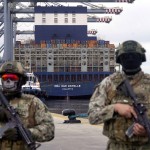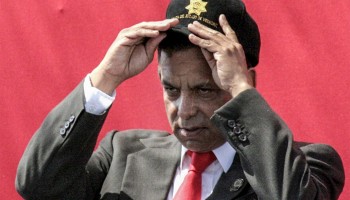The cables detailed collaboration between top mafia bosses and Russian spies, alleged parallel tax systems, police protection for criminal networks, and close relationships between prosecutors and judges, The cables speculated that Putin had hidden “illicit proceeds” from his activities in bank accounts overseas.
Despite being aware of large-scale corruption, international business will be pleased by Mr. Putin’s announcement, because investors will know what to expect, according to a report released by the Eurasia Group.
“Predictability will at least in the short-term reassure investors and improve market sentiment,” the report’s author, Cliff Kupchan, a senior analyst with the consulting firm, wrote.
Predictability is exactly the word to use for Putin 2.0—his new reign could last until 2024, which would make him one of the longest serving Russian leaders.
The New York Times yesterday quoted the Economist Intelligence Unit’s former Soviet specialist Laza Kekic, as saying Mr. Putin’s candidacy announcement was “a retrograde, and indeed farcical step, that is incompatible with economic and political progress in Russia,” putting the country on track to become a “third-world petrokleptocracy.”
Candidate Putin will also have to work to combat the image that he is helping petrol magnates at taxpayer’s expense. He denied allegations this week that he helped Gunvor, an oil company owned by a friend, become the worlds third largest.
Petrol will be an important topic in Putin’s future presidency, as the global financial crisis has pushed rates down, challenging Russia to diversify its economy or risk economic stagnation.
Turkey: Prosecutor Requests 171 Years for Doctor Accused of Organ Trafficking in Kosovo
A prosecutor has asked a Turkish court to sentence Yusuf Sonmez, who was indicted earlier this year for organ trafficking and forming an illicit criminal organization, to 171 years behind bars.
Sonmez allegedly conducted at least 11 organ removal surgeries in Pristina, Kosovo, at a private clinic, and prosecutors say the organs were sold in Israel.
Prosecutors asked for the same sentence for the Israeli intermediary Moshe Harel, reports B92.
EULEX, the European Union body that oversees Kosovo, also issued an indictment for Sonmez, but Turkey said he cannot be extradited. The body is also investigating claims that Kosovo Prime Minister Hashin Thaci was involved in organ trafficking during the 1999 war there. Thaci denied the charges.
Romania: Corrupt Referees
Romania has added its name to the list of countries whose football associations are plagued by the perception of corruption in 2011. On Sunday, Vasile Avram, leader of the Romanian Referees Commission, was arrested for allegedly accepting bribes in exchange for appointing referees who would look favorably on a first division football club, FCM Tirgu Mures.
Avram, accused of receiving €19,000 in May, was scheduled to appoint referees for 2011-2012 championship matches. He will be detained for 29 days. His lawyers have appealed the decision.
The last chief referee was also arrested in 2009 for corruption.
Mexico: Cartels Target Online Activists
Drug Cartel operatives in Mexico have started targeting individuals who publicly criticize them through new media. Reuters carries a report about why the narco-traffickers have been trying to silence—permanently—those who denounce their violence on web portals meant to spread awareness about cartel activities and use virtual community organizing to bring attention to instances of violence.
Maria Macias, a woman who had been trying to encourage other members of an online forum to resist working for cartels, was found mutilated in the city of Nuevo Laredo. Writes Reuters:
"Keep speaking out," she wrote last Thursday under the handle "NenaDLaredo" (or Laredo Girl), according to messages still visible on the site, urging readers to catch the "ratzzz" -- an apparent reference to the brutal Zetas drug gang.
Her mutilated body was found on Saturday morning at a busy intersection, next to computer keyboards and a sign saying: "OK Nuevo Laredo en Vivo and social networks, I am Laredo Girl and I am here because of my reports and yours."
It was signed ZZZZ.
German Business Not Interested in Investing in Ukraine, Citing Growing Corruption
German businesses will not show interest in investing in Ukraine until transparency improves, the German Ambassador to Ukraine, Hans-Jurgen Heimsoeth told Moloda, a Ukrainian media outlet.
“I unfortunately do not see any signs of German investors’ interest in Ukraine. Moreover, there may even be cases of withdrawal of investments, as legal uncertainty is too great, and the actions of regional authorities are self-willed. Therefore, German companies find better conditions in other countries,” he said.
The Ambassador said it was unfortunate that “the opacity of economic activity remains consistently high” in Ukraine, and that the privatization processes are very difficult to understand.
He said he welcomed the government’s effort at reforms, especially of VAT refunds.
VALERIE HOPKINS





